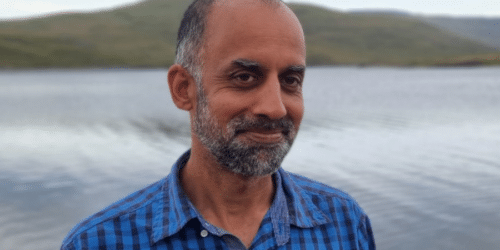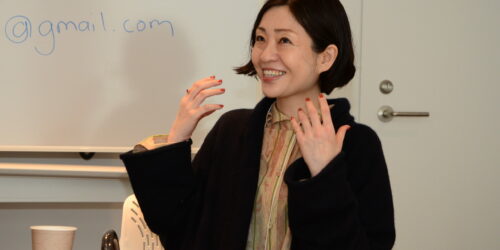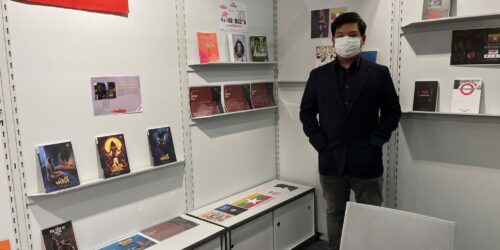
From February to May 2023, NCW collaborated with PEN Myanmar to run Sharing Stories, Connecting Lives, a project supported by the British Council’s Connections through Culture that brought together writers and translators in the UK and Myanmar.
Over five months, the participants followed an online short story course led by tutors in both countries, sharing work with each other and meeting once a fortnight on Zoom. The tutors were San Tun Thaung and Dr Zaw Tun in Myanmar, and ko ko thett and Thett Su San in the UK.
At the end of the course, the writers (and many of the translators) wrote short stories, which were translated by their peers, and are available in an online zine. One of the collaborating pairs were Mariyam Karolia in the UK and Mozart Brang in Myanmar. Here they share their experience.
Mariyam Karolia
The writing and translation of my story Writers Block was a team effort. Both Mozart and I were first timers, I as an emerging writer and Mozart as an emerging translator so without the help of all those around us, our tutors and fellow collaborators the story and its translation would never have come about.
Our emails linking myself with Mozart also connected us with Saya Koko Thett, who helped me polish my writing and Sayarma Su San Thett, who helped polish both our languages and my explanations to Mozart. Further feedback from fellow UK writers Mika and Jessica and editor Nathan Hamilton, not just in this story but previous ones, also helped with the editing.
Collaboration with a translator like Mozart is a godsend, as good as having an editor or proofreader and so long as you are not precious about your work you can receive so much from it. The questions Mozart posed spotlighted the points in the story which required work, be it better adjectives or complete rewriting or flaws in the narrative. There were four edits, stemming from the back and forth of the work we did together, and I admit there could have been more.
It helped me realise that writing for a reader in Myanmar or the North of England is completely different to writing for a reader in London. This is a good thing because it means that we can celebrate a multitude of voices, with all their different nuances and styles.
The setting also played its part. Writers Block is set in northern England/Scotland, but I originally considered setting it in Myanmar, then found without personal experience I could not do this justice. Instead, I chose to bridge the gap with our shared heritage of oral storytelling which, unlike modern writers are advised, has a little more ‘telling’ than ‘showing’. It highlighted a number of cultural differences and similarities also helping us to connect better in ourselves and with the story.
I thoroughly enjoyed this process and recommend it to anyone who is interested in creating multilingual literature. To get the most out of it involves taking the time to create a listening/sharing relationship with your translator and ensuring that all questions are answered in detail. The win side for you in this will be that you will really think about why each word has been placed.
I want to thank the National Centre for Writing and all involved for this amazing opportunity. And to my partner in crime Mozart Brang, who created such a wonderful translation, I am in awe.
Mozart Brang
Maz and I worked together collaboratively. The only challenges that I faced in translation of Maz’s short story were cultural differences. I am from Myanmar, and I had hardly read any English writing. Honestly, I didn’t know how to translate at first, although I chose her story to translate. There were many facts or plots that I didn’t understand in Maz’s first version. I found some plots need to be logical and some are okay not to describe in detail.
I only asked Maz about the things I didn’t understand due to cultural differences and some usages. But there were many questions. Every question I posed to her made her story brighter and brighter. The characters became more alive and beautiful. The climax in the story attracted the reader, not letting on what would come next, but leaving the reader amazed.
But the last version came after many edited versions. Maz sent me four edited versions. She explained very patiently the answer to every single question. I think her patience in explaining helped her to come out with her awesome latest version.
Let me share my experience translating from English to Myanmar (Burmese). I prefer to use the old writing style in our language. That was a problem. My first translation draft didn’t sound interesting. It could not catch the original version of Maz, my translation was so terrible. And then, when Maz sent me her newer versions, each time I had to retranslate again and again, right up to the deadline. However, I could handle it. My angel in translation from English to Myanmar is Sayarma Thett Su San. She was also very patient in pointing out my errors in every single line. Her feedback made my translation to be a satisfactory and well-accepted version even though it is not perfect. She could fix it in line with my preferred style and harmonized it with Maz’s original story.
In my opinion, Maz and I proved that writer-translator’s relationship and collaboration is very essential in Bilingual Literature Work. It would be helpful in all aspects of creative writing, editing, proofreading and etc… I got many experiences and lessons not only from our trainers, idol writers and tutors, but also from my peer mates in this programme. I am very grateful to be a participant in this programme and to have a chance to translate a wonderful story. Thank you!
Read Mariyam’s story Writers Block and Mozart’s translation in our new online zine →
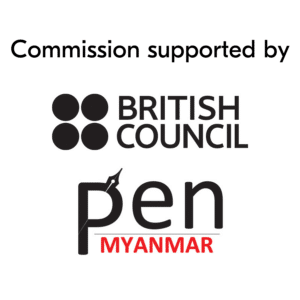
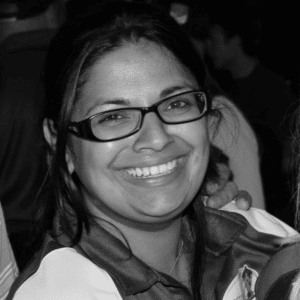 Bradford-based Mariyam Karolia is an emerging poet and writer. She has been published in a number of anthologies and is currently working on her first book.
Bradford-based Mariyam Karolia is an emerging poet and writer. She has been published in a number of anthologies and is currently working on her first book.
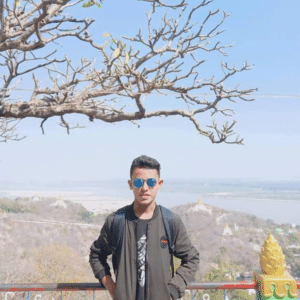 Mozart Brang is a former Political Science student and a study-guide teacher from Myanmar who loves to read and write, though he prefers reading to writing. He is a student without much experience in literature, but he has written some book reviews. He has a place at a non-profit private university recognized by the US Government Higher Education Committee to deepen his knowledge in Politics, Philosophy and Economics.
Mozart Brang is a former Political Science student and a study-guide teacher from Myanmar who loves to read and write, though he prefers reading to writing. He is a student without much experience in literature, but he has written some book reviews. He has a place at a non-profit private university recognized by the US Government Higher Education Committee to deepen his knowledge in Politics, Philosophy and Economics.
You may also like...
Watch ‘This is my ******* country! Bad language and good living in the UK’
Watch this Meet the World panel discussion, exploring the experiences of Nepali Gurkhas living in the UK through the lens of language, cultural expression and identity.

9th November 2023
Translating Sayaka Murata in Tokyo
On a creative, collaborative three-day workshop at Waseda University

5th May 2023
Books from Myanmar make their debut in the world
‘I am proud to have the opportunity to present my books at a stand at the Frankfurt Book Fair’, writes Myay Hmone Lwin

2nd December 2021



